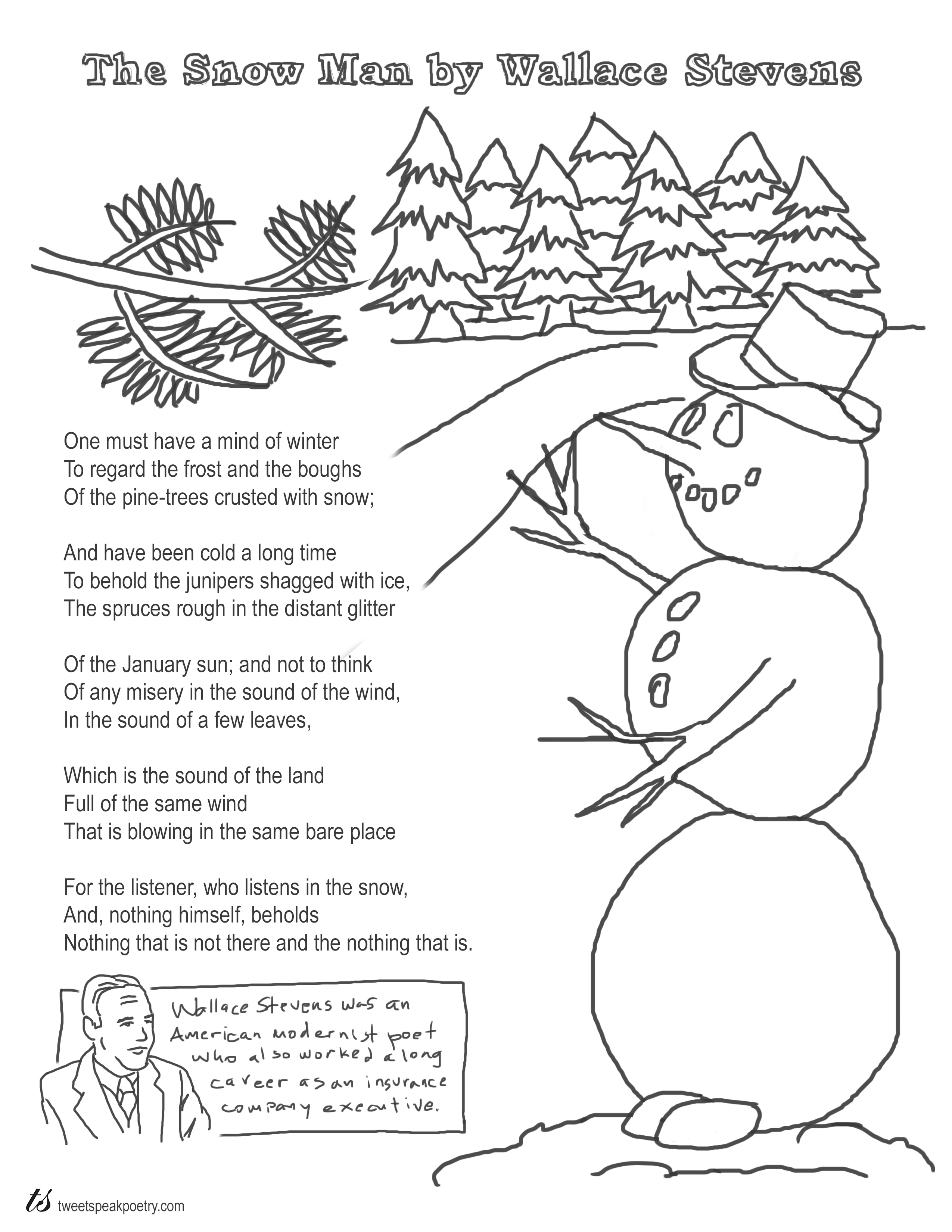Let Us Have a Mind of Winter
Did you do your homework over the winter break? Did you color The Snow Man by Wallace Stevens? Here, it’s not too late.
A lot of ink has been spilled about this poem and not just coloring ink. It’s the kind of poem that tends to divide the poetry-enthusiast from the poetry-averse. It’s a bit inscrutable. That is to say, weird.
Which is why it is excellent to memorize.
Learning a poem By Heart does not necessarily give us the secret key to its meaning. I spent this whole month with “The Snow Man,” with its lack of strict rhyme but with its words that echo: boughs, ice, leaves, beholds. With its repeated words, leaning one line into the next. I still don’t know what it means. I don’t need to know. I love to say the words aloud, into the silence of a winter afternoon, imagining there is a snowman to hear them.
As the succinct biography on the coloring page tells us, Wallace Stevens spent his career working in insurance. He also won the Pulitzer for poetry and two National Book Awards — thus inspiring every poet who has maintained a real job while scribbling verse. The Snow Man was published in Poetry magazine in 1921, but it could have been published this month. It’s that timeless.
A Mind of Winter
I think Stevens’ poem is about perspective. It invites us into the perspective of The Snow Man as we step out of our own limited snow globe and into his. This month I’ve been thinking a lot about this “mind of winter,” and not only because of this poem. I’m also rereading Katherine May’s Wintering, in preparation to lead a TSP book club next month. (Announcement coming soon!) If we are not made from snow, how do we survive our winters?
The physical season of winter is about living with partings — the absence of green, of sun’s light and warmth — and still waking up, eating, walking, working, loving, playing, and sleeping. We are not bears; we do not hibernate. Neither are we robots, pushing endlessly across the frozen tundra.
No, we are trees. We have changed. Can’t you see our bare branches? Or our “junipers shagged with ice,” our “spruces rough in the distant glitter”? Our roots are growing. Not fast, but strong and deep, seeking water and nourishment.
The health of our trees in the heady days of summer depends on how much we have listened, how much we have beheld, how much we have regarded. Whether we cultivated a mind of winter. And a heart too.
Be ahead of all parting, as though it already were
behind you, like the winter that has just gone by.
For among these winters there is one so endlessly winter
that only by wintering through it will your heart survive.
–The Sonnets to Orpheus, part 2, XIII, by Ranier Maria Rilke, trans. Stephen Mitchell
By Heart for February
Next month we’ll learn Sylvia Plath’s “Wintering” By Heart, and over at Patreon, we’ll also be reading Katherine May’s book by the same name. Won’t you join us?
Wintering
This is the easy time, there is nothing doing.
I have whirled the midwife’s extractor,
I have my honey,
Six jars of it,
Six cat’s eyes in the wine cellar,
Wintering in a dark without window
At the heart of the house
Next to the last tenant’s rancid jam
and the bottles of empty glitters –
Sir So-and-so’s gin.
This is the room I have never been in
This is the room I could never breathe in.
The black bunched in there like a bat,
No light
But the torch and its faint
Chinese yellow on appalling objects –
Black asininity. Decay.
Possession.
It is they who own me.
Neither cruel nor indifferent,
Only ignorant.
This is the time of hanging on for the bees – the bees
So slow I hardly know them,
Filing like soldiers
To the syrup tin
To make up for the honey I’ve taken.
Tate and Lyle keeps them going,
The refined snow.
It is Tate and Lyle they live on, instead of flowers.
They take it. The cold sets in.
Now they ball in a mass,
Black
Mind against all that white.
The smile of the snow is white.
It spreads itself out, a mile-long body of Meissen,
Into which, on warm days,
They can only carry their dead.
The bees are all women,
Maids and the long royal lady.
They have got rid of the men,
The blunt, clumsy stumblers, the boors.
Winter is for women –
The woman, still at her knitting,
At the cradle of Spanish walnut,
Her body a bulb in the cold and too dumb to think.
Will the hive survive, will the gladiolas
Succeed in banking their fires
To enter another year?
What will they taste of, the Christmas roses?
The bees are flying. They taste the spring.
Photo by Raychel Sanner, Creative Commons, via Flickr. Post by Megan Willome.
Browse more By Heart
I loved this book. As soon as I finished, I began reading it again.”
—David Lee Garrison, author of Playing Bach in the D. C. Metro
- Perspective: The Two, The Only: Calvin and Hobbes - December 16, 2022
- Children’s Book Club: A Very Haunted Christmas - December 9, 2022
- By Heart: ‘The night is darkening round me’ by Emily Brontë - December 2, 2022



L.L. Barkat says
I wish these posts had Like buttons and that I didn’t always need to try to articulate a response. Because sometimes they make me feel like the way you describe memorizing Wallace feels. There’s depth that I don’t want to try to parse—and I just want to take the experience with me.
In any case, I did love, of course, the idea that we needn’t always compel ourselves to figure out what a poem means. Let the poem be. And be in us.
This quote, I’m taking with me:
“The health of our trees in the heady days of summer depends on how much we have listened, how much we have beheld, how much we have regarded. Whether we cultivated a mind of winter. And a heart too.”
Megan Willome says
Aww, thank you.
This is a poem that is now definitely deep in me. Having a charming snowman drawing to look at while I learned it By Heart did help. (Thanks, Will!)